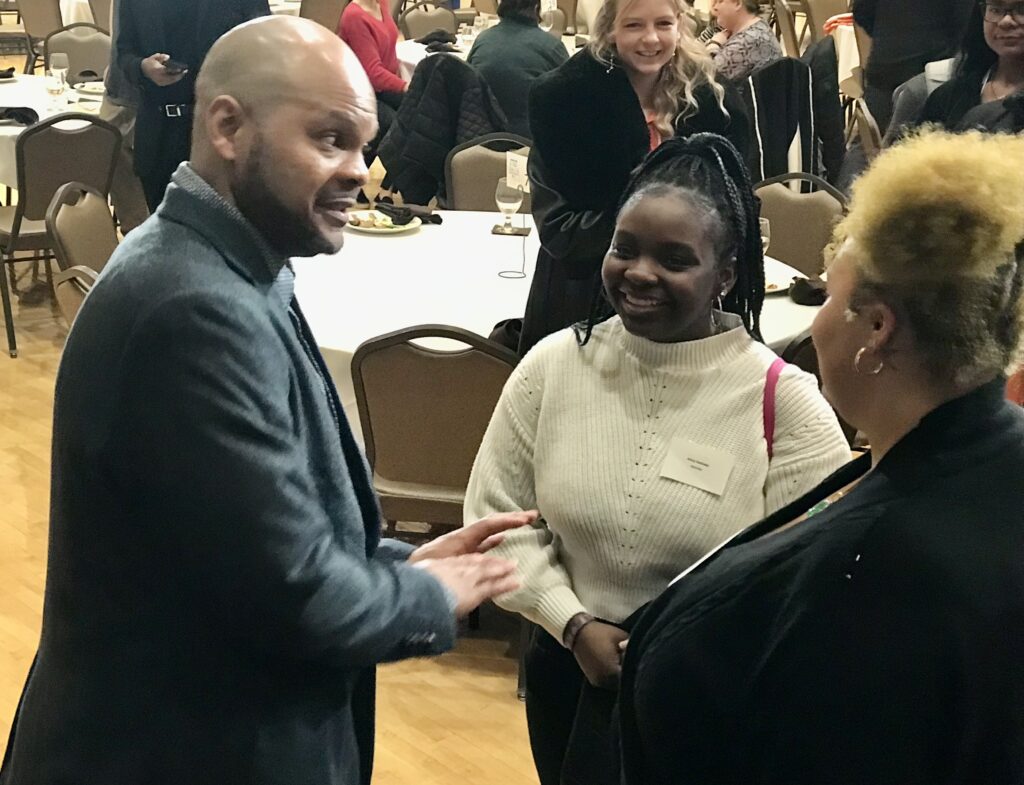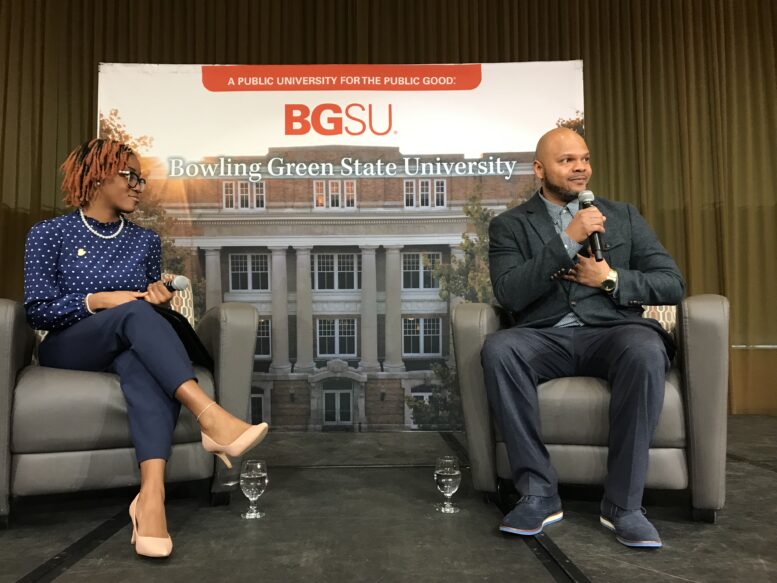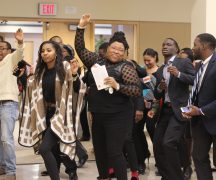By DAVID DUPONT
BG Independent News
Kevin Richardson has cause to be bitter.
He was snatched up by police in the summer of 1989 along with four other teenagers, and falsely charged with the brutal rape and assault on a woman jogging in Central Park.
Richardson, 14, at the time of his arrest and the others were railroaded through the judicial system, and tried in the media. One newspaper called for the Central Park Five to be brought to Central Park where the alleged ringleader would be lynched, and the other four horse whipped.
A prominent real estate developer responded by taking out a full-page ad calling for a return of the death penalty, and enflaming public opinion against the accused teenagers.
They were convicted. Richardson was shipped off to a maximum-security youth facility for “the worst of the worst boys.” Richardson was 16 when he was incarcerated.
“It was horrific,” Richardson, 49, told an audience at BGSU where he appeared as the keynote speaker for the Black Issues Conference on Thursday. He had to grow up fast, and affect “a scowl” to pretend he was tough. Everyone, he said, wanted to beat him up because they thought they knew who he was.

He served seven years of his 10-year sentence, and then he was released parole. During his imprisonment, he sought refuge and education in the prison libraries.
Later evidence turned up that exonerated Richardson and the other four. Another inmate had confessed to the crime, and DNA evidence supported his confession.
The Central Park Five sued and won a $40 million settlement from the City of New York. The Central Park Five became the Exonerated Five.
Some in the legal system have insisted they were still guilty, and the real estate magnate, Donald Trump, has never apologized for that ad and his attacks on them.
Richardson says he pays those folks no mind.
Now Richardson is active fighting against such police and prosecutorial abuse by “the criminal injustice system.”
Asked by Danielle Cain, the BGSU student who interviewed him on stage, if there’s been any progress in the way police handle such cases, he said in terms of New York City, where he grew up and was convicted, no. “Not much has changed since.1989,” he added, “But I’m open to work with police to make a change.” The key is “to get to people understand each other.”
Is he angry? Yes. Is he bitter? No. “Bitterness will send you to the grave faster ,” Richardson said.
Instead, he has learned to channel his anger. If he hadn’t learned to use that anger, he said. “I wouldn’t be here today.”
Though by nature an introvert, he became a public speaker. “This is a process that doesn’t go away. Me traveling across the world, that’s therapeutic,” he said.
“We must do something to change,” he said. “We must occupy all spaces.”
He noted that another of the Exonerated Five, Yusef Salaam, now serves on the city council. Salaam now “has a seat at the table,” Richardson said. “Once we get a seat at the table, we must break bread.”
Richardson works to let people know what their rights are. “You’re never prepared.” He recalled that night as a scared 14-year-old, “dizzy from police brutality” facing seasoned New York detectives, “the best of the best.” They forced confessions from him and the others. Confessions they soon recanted.
He remembers asking his mother at the time why all this was happening to him. “Never question God,” she said. “I lost my faith for some time. I didn’t realize until later on in life. It’s God’s will. Everything now is God’s magic. I’m doing God’s work.”
It’s work others can share in. “Everyone doesn’t have to be an activist to be active. Find what you can do and do it to the best of your ability.”
The five have remained in contact. Though grouped together and living in the same Harlem neighborhood, they didn’t know each other. They did gather together in Los Angeles as filmmaker Ava DuVarney was developing the Netflix mini-series about their case, “When They See Us.”
Richardson said he said that’s when he really got to know about the lives of Salaam, Raymond Santana, and Korey Wise. Antron McCray, whose mother had recently died of cancer and is the one who is most reluctant to discuss the case, was not present.
Asked by Cain what he is most proud of, Richardson said of being a father. He met his wife , Johansy, 20 years ago while they were both working at a nursing home. They have two daughters Jaslynne, 15, and Jayla, 6.
His elder daughter’s name reflects his love of jazz, and she plays drums. Richardson was an avid trumpeter before his life was derailed.
He has received an honorary bachelor’s degree in music from Syracuse University, where he endows a scholarship. There are now four Richardson scholars, each required to do public service as part of the award. “That’s my baby other than my kids,” he said.
And he plans to take some online music courses. He wants jam with his daughter.
Richardson said he had never gone to Central Park after he was imprisoned. In 2020 the entrance to the park in the neighborhood where he grew up was named “The Gate of the Exonerated.”
Now he feels free to visit the park and take his children.


